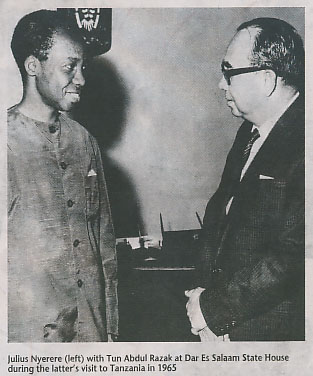Nyerere's legacy of 'familyhood'
Professor Tan Sri Dato' Dzulkifli Abd Razak
Learning Curve : Perspective
New Sunday Times - 05-06-2011
JULIUS Nyerere (April 13, 1922 - Oct 14, 1999) served as the first President of Tanganyika, and later Tanzania -- founded after the union between Tanganyika and Zanzibar -- until his retirement in 1985.
To him, ignorance, poverty and diseases must be combated, these being a result of an act of humans, not God.
Best known as mwalimu, or "teacher" in Swahili, Nyerere was also referred to as Baba wa Taifa (Father of the Nation).
Indeed, he was a teacher, on his return from studying abroad, before he was forced to join politics at the behest of the colonial powers of the time.
He was reported as saying that he was a "schoolmaster by choice and a politician by accident".
Nyerere was known for his deep respect for African culture and values, though he disagreed with some of them, and advocated change where necessary.
Generally, he did not compromise on the mainstreaming of traditions and languages as a move forward.
He had expressed his conviction to develop the country through the African concept of Ujamaa (the traditional cooperative spirit and system), which he translated as "familyhood".
When inaugurating the University College Dar es Salaam in October 1961, he said: "We are in the process of building a Tanganyika nation... Our young men and women must have an African-oriented education. That is, an education which is not only given in Africa but also directed at meeting the present needs of Africa."

The African idea of a university then was as a means of addressing the acute lack of high-level human resource, and at the same time, consolidating the diversity of the country and continent.
Nyerere's counterpart, Ghana President Kwame Nkrumah, also felt that a university was necessary for African unity, and also the well-being of his country and Africa.
But a leading African scholar in the 1970s argued: "African education is intimately linked with international aid and the education industry... and the donor/client relationship has inhibited the development of African institutions (of higher learning) and the capacity of Africans to develop educational policies which are socially relevant and financially feasible."
In short, some regarded the African university as "essentially a product of the Western world" as noted in the book In Search Of Relevance (2008) by a group of academics at the now University of Dar es Salaam.
The book further observed that the state-academia mutuality regarding the basic role and functions of a university hardly went beyond the euphoria of the early independence period.
State elite and academia generally held contrasting views, as the latter advocated the "liberation of African universities from their alien character".
It appears that Nyerere's concept of Ujamaa is in vogue again as universities worldwide are finding their roots in the community once more.
His community-based approaches are finding their way back into many tertiary institutions in the form of "university social responsibility" where knowledge is co-created with the society as one of the new demands on higher education.
Some institutions are clearly making a head start by offering compulsory community involvement, if not immersion, at home and abroad.
Others are contemplating a more permanent involvement by adopting communities as social laboratories for students to acquire essential skill sets as part of their education.
Today, when a university shifts from being an ivory tower, the inclination is for a higher degree of social relevance.
Indeed, the problems of ignorance, poverty and diseases have yet to be resolved at a satisfactory level in many settings, not just Africa.
In many respects, the concerns have expanded to include other societal issues of urbanisation, technology and the environment, to name a few.
In summary, it is no longer sufficient to dwell on purely narrow professional development without paying due regard to how it can be translated into impactful social actions as another core mission of universities today.
The University of Dar es Salaam, as Nyerere's legacy, is poised to take up this mission as it seeks to further transform itself in conjunction with its 50th anniversary this year.
We wish it the best of luck.
* The writer is the Vice-Chancellor of Universiti Sains Malaysia. He can be contacted at vc@usm.my
